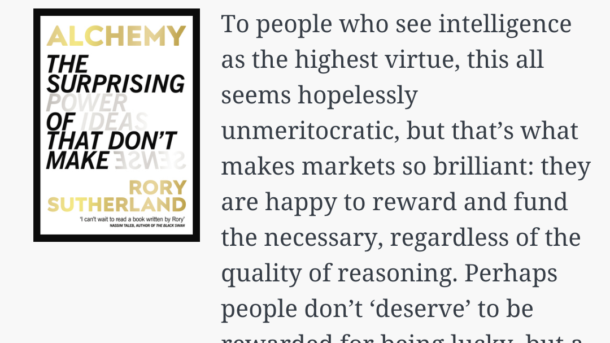It is a never-mentioned, slightly embarrassing but nevertheless essential facet of free market capitalism that it does not care about reasons – in fact it will often reward lucky idiots. You can be a certifiable lunatic with an IQ of 80, but if you stumble blindly on an underserved market niche at the right moment, you will be handsomely rewarded. Equally you can have all the MBAs money can buy and, if you launch your genius idea a year too late (or too early), you will fail. To people who see intelligence as the highest virtue, this all seems hopelessly unmeritocratic, but that’s what makes markets so brilliant: they are happy to reward and fund the necessary, regardless of the quality of reasoning. Perhaps people don’t ‘deserve’ to be rewarded for being lucky, but a system that did not ensure the survival of lucky accidents would lose most of its value. Evolutionary progress, after all, is the product of lucky accidents. Similarly, a system of business that kept empty restaurants, say, open through subsidy, simply because there seemed to be some good reasons for their continued existence, would not lead to happy outcomes. The theory is that free markets are principally about maximising efficiency, but in truth, free markets are not efficient at all. Admiring capitalism for its efficiency is like admiring Bob Dylan for his singing voice: it is to hold a healthy opinion for an entirely ridiculous reason. The market mechanism is loosely efficient, but the idea that efficiency is its main virtue is surely wrong, because competition is highly inefficient. Where I live, I can buy groceries from about eight different places; I’m sure it would be much more ‘efficient’ if Waitrose, M&S, Lidl and the rest were merged into one huge ‘Great Grocery Hall of The People’.* The missing metric here is semi-random variation. Truly free markets trade efficiency for market-tested innovation that is heavily reliant on luck. The reason this inefficient process is necessary is because most of the achievements of consumer capitalism were never planned and are explicable only in retrospect, if at all. For instance, very few companies ever tested the effects of offshoring their call centre operations to countries with low labour costs – it simply became the fashionable thing to do, such was the level of enthusiasm for cost-reduction. The following is a perfect illustration of the tendency of modern business to pretend that economics is true, even when it isn’t. London’s West End theatres often send out emails to people who have attended their productions in the past, to encourage them to book tickets, and it was the job of an acquaintance of mine who worked as a marketing executive for a theatre company to send out these emails. Over time, she learned something that defied conventional economic rules; it seemed that if you sent out an email promoting a play or musical, you sold fewer tickets if you included an offer for reduced-price tickets with the email. Conversely, offering tickets at the full price seemed to increase demand.
Are we able to truly appreciate the semi-random nature of things? What really goes on in your head when you choose to buy a product from say Brand A vs Brand B? Usually, there is a whole bunch of subconscious reasoning that goes on in our heads. After the purchase, we then invest reasons to rationalise our actions and fit it into a narrative. Logic is really good at explaining events post hoc, but not so helpful in predicting new things.
I’ve realised how random things might be quite a while back. I’ve pretty much sometimes just give up on trying to give a reason when asked on why I do the things I do. There probably isn’t a good reason for everything you do. I’ve often wondered and tried to be a little more self aware on why I do certain things? But it pretty much is just about building my own personal narrative on who I wanna be.
Ask any successful CEO on how they have succeeded in building their company, and the answer would most probably a coherent logical narrative tied down to a mix of market factors, competency and hard work. We all desire to justify a narrative for things. To make sure that there a reason for why things are the way they are. This passage ultimately drills down on the core message of the book, that taking a rational and logical approach doesn’t necessarily allow for you to consider a full range of psychological factors. Very often, “logic” can be used to justify both sides of an argument. Logic can fail us, and pretty often at that.



